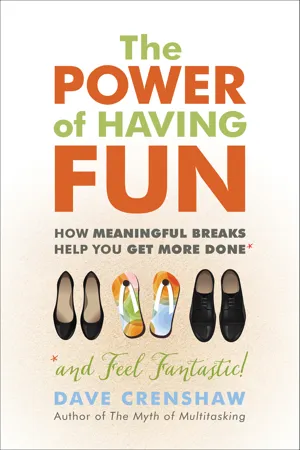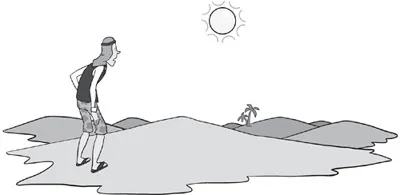![]()
Part One
The Desert and the Oasis
![]()
CHAPTER 1
Lost in the Desert
Consider the tales of two executives . . . well, three.
Story One: Businesscraft
There was once a business owner. He was a young man growing a moderately successful business. He hired employees. He made the sales. He managed the managers. He processed the profits. And most of all, he hustled . . . hard.
So hard, in fact, that when he invited me to provide some productivity coaching, it was clear that he was on his last leg. He was dragging himself through roughly eighty work hours per week. When I first heard that number, my CEO-coach-Spidey-sense began tingling. Putting it bluntly, I’m of the belief that any person who works more than sixty hours per week just simply does not know how to manage time — regardless of how productive they believe they are.
We did a deep dive. We accounted for every lunch break, meeting, phone call, nook, and cranny. Was time management a problem? Of course. But deep within the recesses of this man’s schedule was a secret I was not expecting.
He was a paragon of the community. People flocked to him seeking guidance. He was well liked and had many important friends. His employees respected him. His competition feared him.
Yet he felt guilty, unproductive, and just a touch hypocritical — because a full twenty hours per week were lost to a secret habit he worked hard to hide. His wife and children had no idea. He would become the subject of scorn and ridicule among his peers were they to find out. You see, roughly twenty of those eighty “working” hours were spent in another world . . .
. . . the World of Warcraft.
Each day, he spent hours on end wandering the cyber wilderness as a level 47 Shaman because, in the real world, he was emotionally, mentally, and physically exhausted. He felt that he continually had to keep up appearances for his family and employees. Yet his desire to play caused him to jump in and out of the mists of Azeroth throughout the day to do battle with humans and orcs — then jump back into his business to haggle with suppliers.
When he made his confession to me, he hung his head. He knew he’d been caught. He expected me to tell him it was time to grow up, get focused, and behave as a good business owner should.
Story Two: Power Couple
Next is the story of two executives. They were a married power couple who worked in the same company. They were highly successful in their respective careers.
Together, they were a force to be reckoned with. She excelled in management and marketing. He was a wizard at the technical and financial details. They were a match made for the cover of Fortune magazine. They completed each other, professionally speaking, and they had me at “Hello, will you help us?”
Their relationship outside of work was going stale. Technically speaking, this couple worked a reasonable number of hours each week, meaning they left the office at a reasonable time. The problem was that they never really clocked out because when they got home, every conversation was about work.
Tuna casserole for dinner? Let’s talk sales strategy.
Date night? Action items for the upcoming marketing campaign.
Changing the baby’s diaper? Reevaluate current employee output.
While I helped them on the productivity side, we uncovered a deeper issue that needed resolution. Because a company is a reflection of its leadership, the couple’s lack of balance in their personal lives had begun to be reflected in the lives of their employees. Like their fearless, well-qualified leaders, employees had become drained and were losing enthusiasm for the company.
Because this couple was unable to connect with each other outside of work, not only was their marriage at risk but the business as well.
Defining the Desert
What do these stories have in common?
Both occurred in a metaphorical desert.
If you’ve ever seen a desert epic, such as Lawrence of Arabia, you’ll recognize that, sooner or later, someone’s going to have to walk a very, very long way to get from one side of the desert to the other.
Man, I hate those scenes. If you’re like me, you just can’t wait for them to end. Look, I get it, Peter O’Toole is thirsty. Give him a Vitaminwater or cut to the next scene.
This perhaps overused desert trope is symbolic of many struggles in our lives, isn’t it? Nothing comes easy. In spite of adversity, we need to keep pressing forward for what we desire because, despite the obstacles, we can make it! Hard work and perseverance are rewarded! Play a fanfare! Start the parade! Hail the conquering hero!
So, what’s your desert today?
When I say desert, I have a specific definition in mind. A desert is how I’ll refer to an extended period of deprivation and/ or chaos in your life.
What is something that you’re pushing yourself through? What’s a situation for you that’s slow and painful, where you’re ignoring the signs that life is giving you to slow down or stop? Where are you putting up with extended periods of chaos because you’re in such a hurry to get to the other side?
Before you attempt to answer these questions, it might be helpful to explore some possible deserts. Often, we carry our own deserts with us. What do I mean? In coaching executives and managers around the world, I’ve come across several deserts people carry on their backs as they live life.
THE RETIREMENT DESERT
Many people relentlessly push themselves in careers they hate just to reach the glorious shores of retirement. All the years and stress they put in will finally pay off. Someday, maybe, everything will be great, right? You can finally buy that RV you’ve always wanted and drive across the country. Or maybe you’ll just live on a cruise ship in perpetuity — just one more slice of cheesecake . . . I don’t want to be too full for shuffleboard this afternoon!
In the meantime, there’s a lot of misery for a lot of folks. A study conducted by Harris and the University of Phoenix found that 59 percent of American workers wish they were in a different career. For those in their thirties, the number of disenchanted employees bumps up to 73 percent.
This news wouldn’t be so bad if most people were truly building toward a healthy end-of-desert retirement plan. Yet they aren’t. Per a GOBankingRates study, one-third of all Americans have absolutely zero in retirement savings, and 56 percent have less than $10,000 saved. How long of a postcareer retirement will that afford you? Which brings up our pal inflation, humming along on average at just over 3 percent. Not too bad, right? Until you consider that a paltry 3 percent increase means prices more or less double every twenty years.
THE ENTREPRENEURIAL DESERT
For some, such as entrepreneurs and corporate executives, reaching the other side of the desert may be cashing out. You sacrifice your time, health, sleep, and occasionally a relationship or two so that a glorious harvest will occur when Microsoft or Google or some other large company comes in and buys you out. With a small percentage of the proceeds, you could buy your own private island, a sports car, and a football franchise. Perhaps Shark Tank will cast you as one of the new “sharks.” You’ll be on TV and the cover of Inc. magazine. Your name will be synonymous with luxury and opulence, like a boss.
Unfortunately, exit rarely happens the way you might think. Most business owners admit to me that they don’t reach the exit they intended in the beginning, and — if they created a vision several years ago — they are currently nowhere close to realizing it. Yet they continue to sacrifice health, credit, and relationships on the altar of their businesses, hoping to appease the tribal deities of Musk, Zuckerberg, and Bezos, who may smile upon them and bestow a bounty of wealth.
THE PERSONAL DESERT
Others carry a much more personal desert with them. For some, reaching the other side may be when their children move out. I’m a father, and I love my kids dearly. However, I also know the sweet morsels of freedom that my wife and I enjoy when the little monsters are out of the house for an hour or two. Heck, just keeping the house clean for more than twelve minutes at a time would be a blessed occurrence. Am I right? If that’s your idea of a good time, then you might be a parent.
Kids are certainly not the only personal challenge. Others might feel the other side of the desert is when they get married, or when they get divorced, or when they graduate from college, or when they can finally quit physical therapy, or when they work up the courage to ask someone on a date. Your desert might be just making it through the workweek so that you can party on Friday! The list is endless.
WHAT THE DESERT IS NOT
To clarify, hard work is a good thing. We should not be afraid of effort but embrace it. Effort helps us grow and makes us stronger for the coming years. There’s even some joy and happiness to be found in an honest day’s work.
One of my favorite quotes about work comes from an unlikely source. Former US president Richard Nixon isn’t remembered fondly for many things — perhaps rightly so — yet I respect him for saying, “To write a novel, you need an iron butt.” Brilliant. Nothing crooked about that statement.*
In other words, if you’re going to write a book, you need to put your butt in the chair and stay there until it gets done. I quite literally schedule “iron butt” time in my calendar when I set aside time to write. In addition to the mental demand, writing is also a test of maximal gluteal fortitude.
To do whatever it is you do, you need an iron something. Need to do those taxes? You also need an iron butt. Need to go out and make sales door to door? Iron legs. Creating a new proposal? Iron fingers and an iron mind. Kissing booth for charity? . . . You get the idea.
Hard work by itself is not a desert, yet it can quickly become so if we aren’t vigilant. When we work as long as it takes to get the job done, when we keep pushing past the emotional and mental dehydration and deprive ourselves of necessary replenishment, we are building a life and career that are less likely to be successful.
Continual deprivation creates deficiency. Enduring chaos engenders fatigue. And, as the great coach Vince Lombardi said, “Fatigue makes cowards of us all.” This is the desert we’re targeting in this chapter.
Taking Your First Actions
Let’s pause for a moment. After all, this book is a private coaching session, with me acting as your coach. Every once in a while, you’re going to see an image like this:
This icon is called an Oasis Action, and it means your coach wants you to do s...


